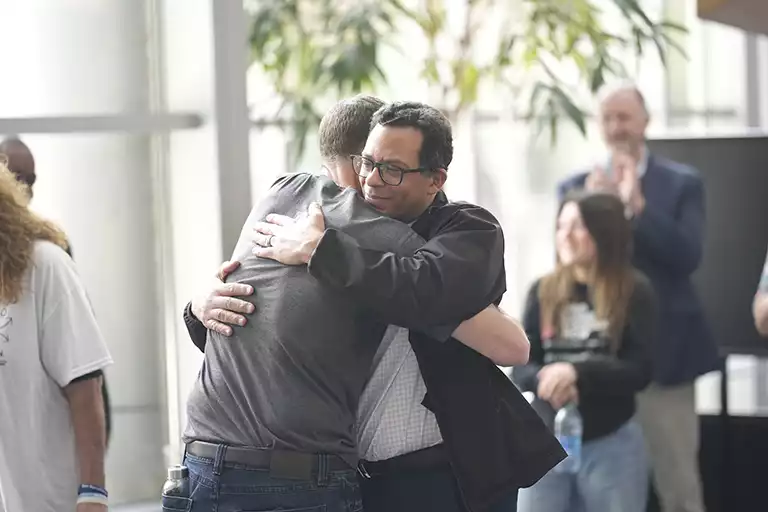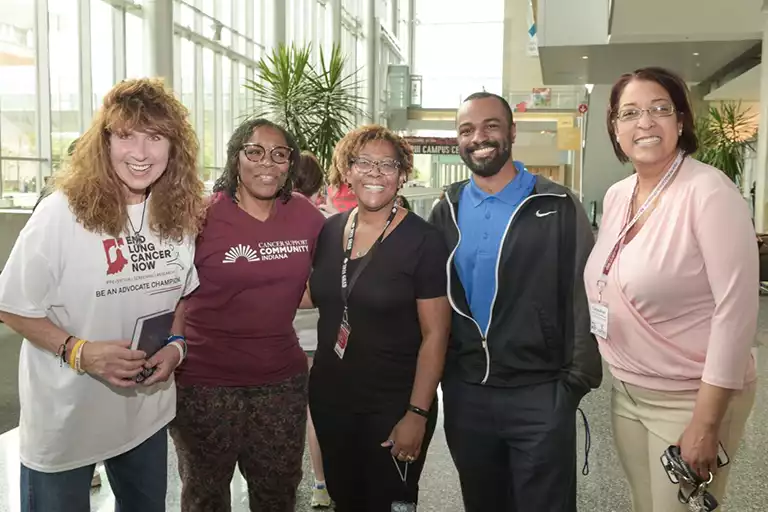By Nasser Hanna, M.D.
August 15, 2024
Anyone with lungs can get lung cancer: screening & health education saves lives
Lung cancer is the No. 1 cause of cancer death in the U.S. Each year, lung cancer takes the lives of more than 127,000 people in the U.S.—that’s more than colon and breast cancer combined.
Anyone with lungs can get lung cancer. It doesn’t matter your gender or ethnic background, or whether you are rich, poor, urban or rural. While smoking is the most common cause, environmental and even genetic risk factors can cause lung cancer in never-smokers.
But there is good news.

A simple, noninvasive lung cancer screening exam can catch the disease, even before symptoms begin. At least half of the cancers found upon screening are Stage I, which is early-stage cancer and 90% curable.
Today, only 5% of Hoosiers who are at high risk for lung cancer get screened. That means thousands of patients could avoid suffering from the devastating effects of lung cancer if they knew about—and could access—lung cancer screening.
The End Lung Cancer Now (ELCN) team at IU Simon Comprehensive Cancer Center is working to change that dire statistic. From screening and education programs to advanced research studies and clinical care centers, ELCN is spreading the word about who should be screened for lung cancer and how these quick, painless exams can save lives.
Changing the course of lung cancer in Indiana starts with two easy steps:
- Know your risk.
- Get screened if you are eligible.
Knowing your lung cancer screening results can give you peace of mind. And if you are diagnosed with lung cancer, our specialist team can give you the very best care—no matter where in Indiana you live.
Who is at risk for lung cancer?
While anyone can get lung cancer, some factors can increase your risk. If you have a personal or family history of any of these common risk factors, talk with a health care provider about your screening options.
Women
Lung cancer is not just a men’s disease. While men have a slightly higher likelihood (1 in 16) than women (1 in 17) of developing lung cancer, younger women ages 30-49 are being diagnosed at higher rates than men.
Women in Indiana smoke at a higher rate than women in other states, according to American Health Rankings. However, about 20% of women diagnosed with lung cancer have never smoked, compared with just 8% of men.
So, it is just as important for women to get lung cancer screening as it is for men. Talk with a health care provider if you have a personal or family history of smoking or lung cancer. See what women need to know about lung cancer screening.
Smoking
About 80% of lung cancer deaths are associated with smoking. A smoker’s risk of developing or dying from lung cancer is 15-30 times higher than a non-smoker's. Secondhand smoke exposure is the third most common cause of lung cancer in the U.S.
Quitting can reduce your risk of developing lung cancer by 30%-50% after 10 years. And you won’t have to do it alone! Our tobacco treatment specialists can help you make a personalized plan to quit that could include medication and behavioral counseling. Quit Now Indiana offers text message support and online tools to break the cycle of nicotine addiction.
History of lung disease
Chronic inflammation of lung tissue may cause cell changes that result in lung cancer. Some conditions that have been associated with lung cancer include:
- Chronic obstructive pulmonary disease (COPD)
- Chronic bronchitis
- Emphysema
Talk with a health care provider about your risk of developing lung cancer if you have a history of lung disease.
Genetics and family history
Research has shown that if your parents, siblings, or children have had lung cancer, you have a 50% higher risk than someone with no family history of the disease. Genetic testing can help identify changes in your genes that may increase your lung cancer risk. You can’t change the genes you were born with, but you can use genetic testing results to inform a healthy lifestyle.
Social determinants of health
Factors beyond your control can increase lung cancer risk. These social determinants of health (SDOH) can include your access to health care and screening exams, along with environmental exposures such as:
- Radon: This naturally occurring gas can’t be seen, tasted, or smelled, but it is the leading cause of lung cancer in non-smokers. Radon can become concentrated indoors, increasing your risk of lung cancer.
- Asbestos: Asbestos is present in some older homes and buildings. In general, it isn’t considered harmful unless it’s released into the air. People who work in mines, mills, textile plants, and shipyards are several times more likely to get lung cancer due to asbestos exposure.
- Other carcinogens: Cancer-causing substances can include radioactive ores, inhaled chemicals, and diesel exhaust.
- Pollution: Air pollution is associated with 1% to 2% of lung cancer deaths.
A primary care provider or social worker can connect you with resources to help reduce SDOH burdens on your health.
Who should get screened for lung cancer?
Research has shown that finding lung cancer early with screening can reduce cancer deaths by 30%-50% in women and 5%-10% in men. These are energizing statistics—yet only about 5% of eligible Hoosiers get screened.
Screening eligibility criteria from the U.S. Preventative Services Taskforce include:
- Age: 50-80
- Smoking history: A 20 pack-year smoking history. For example, one pack/day for 20 years is 20 pack-years. Two packs/day for 10 years is 20 pack years.
- Smoking status: Currently smoke or have quit within the past 15 years.
Lung cancer screening saves lives. Advocates including the American Cancer Society and American College of Radiology are working to broaden screening criteria so more people—including military veterans and workers in high-risk industries—have better access.
If you don’t meet the basic criteria and want to be screened, talk with a health care provider. They can work with you to see what exams you need and what may be covered by insurance.
How lung cancer screening works
Lung cancer screening is a simple, quick process that should be done every year if you are eligible. The exam takes three minutes or less, and you don't have to do anything to prepare for it. You’ll lie on an exam table, and the provider will use a low-radiation CT scanner to look inside your chest and upper abdomen for lesions—spots or abnormal tissue that could be a sign of cancer.
Results are typically available in less than 24 hours. A negative result means we do not suspect lung cancer. A positive result does not mean that you have cancer—it means you need more detailed imaging of the lesions. A sample of lung tissue may be needed to diagnose or rule out cancer.
First mobile screenings in Indiana
In 2025, a Mobile Lung Screening Program is launching to reach more people throughout Indiana who are at high-risk for developing lung cancer. The first of its kind in the state, our mobile program will bring CT screening technology, patient education, and prevention resources into communities so people don’t have to travel far to get lung cancer screenings.
The mobile program is funded by a generous donation from the Wood Family Foundation and a matching gift from IU Health.
Related reading: We’re finding answers about every stage of lung cancer

What happens if I get lung cancer?
If you are diagnosed with lung cancer, experts will be by your side from day one to answer your questions and create the best treatment plan. Your plan will be based on the stage of your lung cancer:
- 0: An early lung cancer that has not spread from the top lining of the lung.
- I: Small tumors that are just in the lungs.
- II: Larger tumors that may have spread to lymph nodes near the lungs.
- III: Cancer has spread to lymph nodes and the middle of the chest.
- IV: Cancer has spread to other parts of the body, such as the bones or brain.
Depending on the stage of cancer, a combination of surgery, radiation therapy, chemotherapy, and immunotherapy may be recommended. A team of cancer center experts reviews every patient’s imaging and works together to create a customized plan with the most effective and least invasive therapies.
Advanced treatment, backed by research
Lung cancer treatment is advancing every day. Patients at IU Simon Comprehensive Cancer Center can join clinical trials and access new treatments before they’re widely available elsewhere. The cancer center is currently participating in 16 lung cancer clinical trials to understand how new medications and approaches can improve lung cancer care. Research helps extend better lung cancer care for patients in Indiana and beyond. Some of our most recent work includes:
- Personalized prevention plans: The cancer center is making personalized “prescriptions” to streamline screenings for lung and other cancers based on a patient’s personal risk factors.
- Biomarker testing: Our team is exploring how genetics affect lung cancer risk, with the hope of influencing the national screening guidelines.
- End Lung Cancer Now Blueprint: We designed a set of recommendations other health centers can use to transform, scale, and centralize lung cancer screening programs.
Lung cancer doesn’t discriminate. Anyone with lungs can develop lung cancer—but it doesn’t have to be this way. By helping more patients and providers understand the risk for lung cancer and the benefits of screening, ELCN can expand access and spare more families from suffering with lung cancer.




